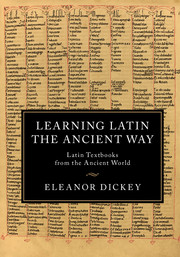5 - Prose composition
Published online by Cambridge University Press: 05 March 2016
Summary
Many elementary Latin students spend a significant amount of time translating English sentences into Latin in order to practice different forms and constructions. It is striking that there is no evidence of such activity in antiquity; perhaps the evidence has been lost, but if ancient students had translated anything approaching as many sentences as modern ones do we would expect at least a few to survive. It is therefore tempting to conclude that ancient Latin learning aimed only at passive competence: students learned to read the language but not to write it.
Yet this can hardly be the right answer, since the purposes for which Greek speakers learned Latin required active competence: merchants negotiating with the Roman army needed to be able to speak Latin, and lawyers drawing up wills and other documents needed to be able to write it. How, then, was that competence achieved?
One possible answer to that question is provided by a papyrus of the third or fourth century ad containing a set of Greek fables translated into Latin by one or more learner(s). These look strikingly like exercises in prose composition and raise the possibility that learners practiced translation into Latin only in paragraph-sized chunks, not with individual sentences. Although we tend to think of paragraphs as more difficult than sentences, the ancients may not have had the same view. Individual sentences of real Latin and Greek texts are notoriously difficult to understand out of context, and it may be that speakers of those languages simply considered the paragraph the smallest unit that it was practical to set for translation practice.
The translator of the extract below (Babrius, Fable 16, a misogynistic tale) can be recognized as an advanced Latin learner not from the spelling mistakes, which could have been made by a native speaker, nor from the use of the non-existent word frestigiatur (which is so strange that it cannot reliably be attributed to any particular source), but from the participles. Latin has a limited set of participles: in the present tense all verbs have only active participles, and in the perfect tense, while most verbs have only passive participles, deponent verbs have only active ones.
- Type
- Chapter
- Information
- Learning Latin the Ancient WayLatin Textbooks from the Ancient World, pp. 116 - 118Publisher: Cambridge University PressPrint publication year: 2016



